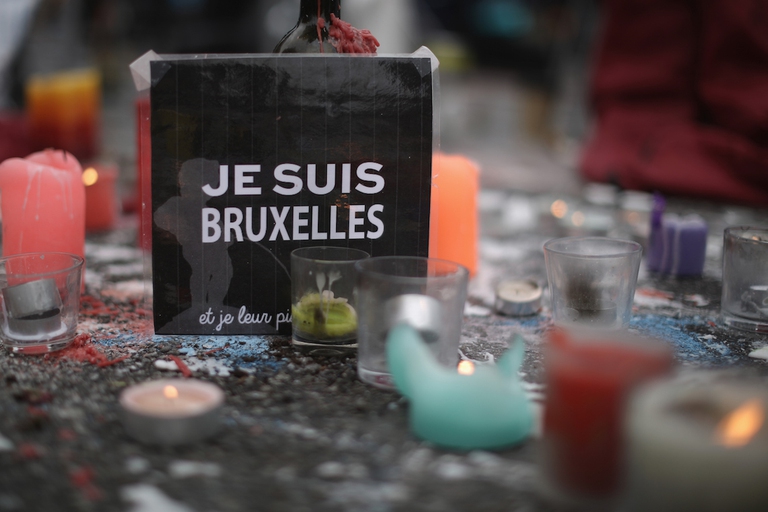
As per tradition after 12 years India held Mahakumbh, the world’s largest spiritual congregation that has been attracting pilgrims from across the globe.
Two explosions rocked the departures area in Zavantem international airport. Then, another explosion devastated the metro station of Maelbeek, about an hour and a half later. This is how the attacks to Brussels and to the very heart of Belgium and Europe begun on 22 March, just a few steps from the main communitarian institutions.
Two explosions rocked the departures area in Zavantem international airport. Then, another explosion devastated the metro station of Maelbeek, about an hour and a half later. This is how the attacks to Brussels and to the very heart of Belgium and Europe begun on 22 March, just a few steps from the main communitarian institutions.
“We saw people running away, everybody was going crazy,” told Gianfranco B., witness at Brussels airport, to LifeGate. “We firstly thought it was a false alarm. We couldn’t believe a similar attack could hit one of Europe’s main international airports”.
As hours went by, death toll rose to 34 victims, with over 198 injured. On 22 March, 225 armed soldiers patrolled the European Commission’s headquarters, while all vehicles were blocked in order to ease ambulances’ circulation. Metro lines, railway stations and the airport were evacuated and closed. The day after, the city was paralysed and guarded by security forces.
The terrorist attack was confirmed shortly after 13:00 through a public statement by the Amaq Agency: the Islamic State claimed responsibility of the attacks and threatened to further hit Europe.
A “cordon sanitaire” has been set up around Belgium in order to isolate the threat: flights arriving at and departing from the country have been cancelled. France and Germany closed their borders, while Eurostar trains between London and Brussels have been suspended. Many problems have been also reported with telephone lines. The government has called a national security council to face the emergency.
The attacks have hit a city already characterised by high alert levels and theatre of the arrest – thanks to a blitz carried out by police forces four days ago – of the most-wanted terrorist Salah Abdeslam. The man, considered to be the mastermind behind the Paris attacks, was allegedly planning further attacks in Europe. Meanwhile, 25-year old Najim Laachraoui, considered one of the organisers of the Paris attacks whose trails were found in his hideout in Molenbeek district, remains a fugitive. His DNA was found in two belts: one used at Bataclan theatre, the other at the Stade de France.
“With the Brussels attacks, the whole of Europe has been hit,” said French President Francois Hollande, while Europe leaders spoke out against the attacks declaring their support to Belgium. EU Foreign Policy Chief Federica Mogherini broke down in tears when speaking of the Brussels bombings: “Europe and its capital are suffering the same pain that Middle East has known and knows every single day”. German Chancellor Angela Merkel condemned the “coward attacks” in Brussels, asking for unity and determination, while British Premier David Cameron urged Europe to remain united: “We won’t let these terrorists win”.
Siamo anche su WhatsApp. Segui il canale ufficiale LifeGate per restare aggiornata, aggiornato sulle ultime notizie e sulle nostre attività.
![]()
Quest'opera è distribuita con Licenza Creative Commons Attribuzione - Non commerciale - Non opere derivate 4.0 Internazionale.
As per tradition after 12 years India held Mahakumbh, the world’s largest spiritual congregation that has been attracting pilgrims from across the globe.
Workers in tea gardens of West Bengal, India, that produces Ctc tea for domestic consumption complain that they have been devoid of basic facilities while political parties make hollow promises during every elections which are never fulfilled.
India is in the middle of the elections, but sadly none of the politicians have uttered a word on man-animal conflict that has been devouring several lives every year.
Manipur, a state in north-east India, is still reeling under the tremors of violence that broke out last year devouring lives and paralyzing the economy.
The government of Tanzania is currently planning to evict more than 80.000 indigenous Maasai people from their ancenstral land
A new UNU-INWEH report on the global bottled water industry reveals the massive scale of this market and the lack of strict quality controls.
Isatou Ceesay founded a social enterprise that is helping to fight plastic pollution and empowering women and young people to gain economic independence.
In 2020, Mihela Hladin made a radical decision that many, in recent times, have probably considered. This is her story, with photos by Matt Audiffret.
The Brazilian government has started evicting illegal gold miners, responsible for the health emergency that has hit the Yanomami people.








